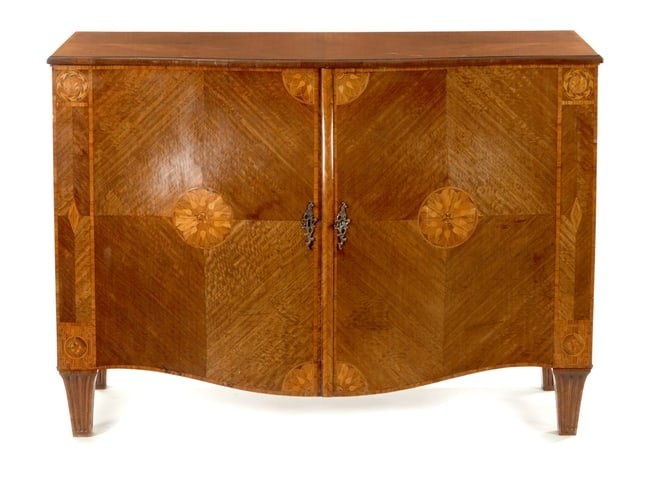A FINE AND IMPORTANT GEORGE III SERPENTINE TULIPWOOD AND MARQUETRY MAHOGANY COMMODE ATTRIBUTED TO
A FINE AND IMPORTANT GEORGE III SERPENTINE TULIPWOOD AND MARQUETRY MAHOGANY COMMODE ATTRIBUTED TO CHRISTOPHER FUHRLOHG A FINE AND IMPORTANT GEORGE III SERPENTINE TULIPWOOD AND MARQUETRY MAHOGANY COMMODE ATTRIBUTED TO CHRISTOPHER FUHRLOHG with a pair of hinged doors inlaid with stylised flower head panels; raised on fluted tapering feet. Circa 1770, attributed to Christopher Fuhrloh, the quarter veneered top above a pair of doors opening to three adjustable shelves, the doors centred by flowerhead marquetry reserves, flanked by anthemion and bellflower marquetry decorated pilasters, on fluted square tapering legs, 103cm high, 143cm wide, 67cm deep For a closely related pair of commodes said to be in the manner of Christopher Fuhrlog, see Christie's London, The Gothick Pavilion - Byron to Beaton, 9th December 2010, lot 59 (?39,650). When offered, the provenance quoted for the pair of commodes was The Hochschild Collection, sold Sotheby's London, 1 December 1978, lot 55. For a related table also said to be in the manner of Fuhrlohg see Sotheby's London, Collections, 2nd May 2017, lot 319 (?10,000). The Swedish emigr? craftsmen Christopher Fuhrlohg (d. 1790) is known to have worked for John and William Linnell. Fuhrlog's known work is characterised by a high neoclassical design and exceptional quality of timber. The Paris-trained Swedish ebeniste Christopher Fuhrlohg is first recorded in 1767. In that year he signed a vase-embellished commode at Castle Howard, Yorkshire. The commode is thought to have been executed by Fuhrlog at the start of his London career with the Berkeley Square cabinet-makers William and John Linnell, and before the establishment of his Tottenham Court Road workshops and court appointment as 'Cabinet-maker, Inlayer and Ebeniste' to George, Prince of Wales, later George IV. Fuhrlog's own furniture and the stock-in-trade of his Gerrard Street house was sold by Christie's on 21 February 1787 and described as consisting of a 'Great variety of Elegant Mahogany and Sattin-Wood articles, curiously [finely] Inlaid, several of which are on a new Construction, such as Bookcases, Commodes...' (G. Beard and C. Gilbert, Dictionary of English Furniture Makers, Leeds, 1986, pp. 323-325). A commode attributed to Fuhriohg is illustrated in Lucy Wood, Catalogue of Commodes, London, 1994, p. 145, fig. 145. (103cm high 143cm wide 67cm deep)
[ translate ]Sale price
Estimate
Reserve
Time, Location
Auction House
A FINE AND IMPORTANT GEORGE III SERPENTINE TULIPWOOD AND MARQUETRY MAHOGANY COMMODE ATTRIBUTED TO CHRISTOPHER FUHRLOHG A FINE AND IMPORTANT GEORGE III SERPENTINE TULIPWOOD AND MARQUETRY MAHOGANY COMMODE ATTRIBUTED TO CHRISTOPHER FUHRLOHG with a pair of hinged doors inlaid with stylised flower head panels; raised on fluted tapering feet. Circa 1770, attributed to Christopher Fuhrloh, the quarter veneered top above a pair of doors opening to three adjustable shelves, the doors centred by flowerhead marquetry reserves, flanked by anthemion and bellflower marquetry decorated pilasters, on fluted square tapering legs, 103cm high, 143cm wide, 67cm deep For a closely related pair of commodes said to be in the manner of Christopher Fuhrlog, see Christie's London, The Gothick Pavilion - Byron to Beaton, 9th December 2010, lot 59 (?39,650). When offered, the provenance quoted for the pair of commodes was The Hochschild Collection, sold Sotheby's London, 1 December 1978, lot 55. For a related table also said to be in the manner of Fuhrlohg see Sotheby's London, Collections, 2nd May 2017, lot 319 (?10,000). The Swedish emigr? craftsmen Christopher Fuhrlohg (d. 1790) is known to have worked for John and William Linnell. Fuhrlog's known work is characterised by a high neoclassical design and exceptional quality of timber. The Paris-trained Swedish ebeniste Christopher Fuhrlohg is first recorded in 1767. In that year he signed a vase-embellished commode at Castle Howard, Yorkshire. The commode is thought to have been executed by Fuhrlog at the start of his London career with the Berkeley Square cabinet-makers William and John Linnell, and before the establishment of his Tottenham Court Road workshops and court appointment as 'Cabinet-maker, Inlayer and Ebeniste' to George, Prince of Wales, later George IV. Fuhrlog's own furniture and the stock-in-trade of his Gerrard Street house was sold by Christie's on 21 February 1787 and described as consisting of a 'Great variety of Elegant Mahogany and Sattin-Wood articles, curiously [finely] Inlaid, several of which are on a new Construction, such as Bookcases, Commodes...' (G. Beard and C. Gilbert, Dictionary of English Furniture Makers, Leeds, 1986, pp. 323-325). A commode attributed to Fuhriohg is illustrated in Lucy Wood, Catalogue of Commodes, London, 1994, p. 145, fig. 145. (103cm high 143cm wide 67cm deep)
[ translate ]


